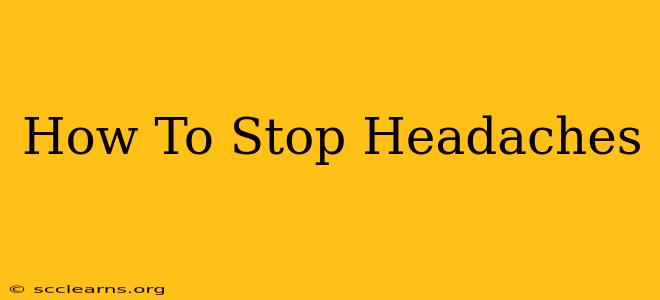Headaches. That throbbing, pounding, or even dull ache that can disrupt your day and leave you feeling miserable. They're a common ailment, affecting millions worldwide, but understanding their causes and effective relief methods can significantly improve your quality of life. This comprehensive guide explores various headache types, triggers, and proven strategies to stop the pain.
Understanding Your Headache: Types and Triggers
Before diving into solutions, identifying the type of headache you experience is crucial. This helps pinpoint the most effective treatment approach.
Common Headache Types:
-
Tension Headaches: These are the most frequent type, characterized by a mild to moderate pain, often described as a tight band or pressure around the head. Stress, dehydration, and poor posture are common triggers.
-
Migraines: Migraines are more severe and debilitating, often accompanied by throbbing pain, usually on one side of the head. They can also involve nausea, vomiting, and extreme sensitivity to light and sound (photophobia and phonophobia). Triggers can vary widely and include certain foods, hormonal changes, stress, and even weather patterns.
-
Cluster Headaches: These are intensely painful headaches that occur in clusters, with multiple headaches occurring over a period of days or weeks, followed by periods of remission. They are often accompanied by tearing in one eye, nasal congestion, and even sweating.
-
Sinus Headaches: These headaches are often mistaken for other types but are associated with sinus inflammation or infection. The pain is typically felt in the forehead, cheeks, or around the eyes.
Identifying Your Triggers:
Keeping a headache diary can be incredibly helpful in identifying personal triggers. Note down the following information each time you experience a headache:
- Date and Time: When did the headache start and end?
- Pain Location and Intensity: Where did you feel the pain, and how severe was it (on a scale of 1-10)?
- Symptoms: Did you experience nausea, vomiting, sensitivity to light or sound?
- Potential Triggers: What did you eat, drink, or do before the headache started? Consider stress levels, sleep patterns, and environmental factors.
Effective Ways to Stop a Headache
Once you've identified your headache type and potential triggers, you can implement strategies to prevent and alleviate symptoms.
Immediate Headache Relief:
-
Over-the-Counter Pain Relievers: Ibuprofen (Advil, Motrin) and naproxen (Aleve) are effective for tension headaches and mild migraines. Acetaminophen (Tylenol) can also provide relief. Always follow dosage instructions.
-
Hydration: Dehydration can trigger headaches. Drink plenty of water, especially if you've been sweating or haven't had enough fluids.
-
Rest in a Dark, Quiet Room: Reduce external stimuli by resting in a dimly lit, quiet space. This is particularly helpful for migraines.
-
Cold or Warm Compress: Applying a cold compress to your forehead or neck can soothe pain. Some people find warm compresses more effective.
Long-Term Headache Management:
-
Lifestyle Changes:
- Stress Management: Practice relaxation techniques like yoga, meditation, or deep breathing exercises.
- Regular Sleep: Aim for 7-8 hours of quality sleep each night.
- Healthy Diet: Eat a balanced diet rich in fruits, vegetables, and whole grains. Limit processed foods, caffeine, and alcohol.
- Regular Exercise: Physical activity can help reduce stress and improve overall health.
- Good Posture: Maintain good posture to avoid muscle tension headaches.
-
Prescription Medications: For chronic or severe headaches, a doctor may prescribe stronger pain relievers, triptans (for migraines), or other medications.
-
Alternative Therapies: Some people find relief through alternative therapies such as acupuncture, massage therapy, or biofeedback.
When to See a Doctor
While many headaches can be managed at home, it's crucial to seek medical attention if:
- Headaches are sudden, severe, or worsening.
- You experience headaches accompanied by fever, stiff neck, vision changes, or weakness.
- Over-the-counter pain relievers don't provide relief.
- You suspect a serious underlying medical condition.
Don't hesitate to consult a doctor or neurologist for diagnosis and personalized treatment if your headaches are persistent or concerning. They can help determine the underlying cause and recommend the most effective management strategy for your specific needs. Remember, effective headache management often requires a multifaceted approach, combining immediate relief strategies with long-term lifestyle changes.

